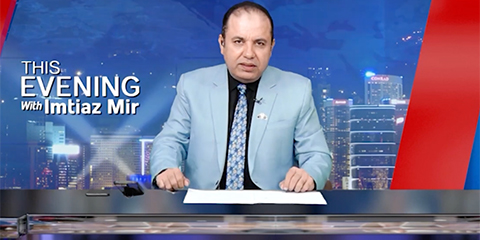
PFUJ calls for end to Impunity for Crimes Against Journalists
November 02, 2025: PFUJ urges Pakistan’s federal and provincial governments to end Impunity for Crimes Against Journalists and ensure their safety and press freedom.
JournalismPakistan.com | Published 13 years ago | Saadia Khalid
Join our WhatsApp channel
LEEDS: A proper journalist is expected to have a handful of professional skills. This could include writing, reporting, identifying an issue, digging up facts, being impartial, focused, well connected, resourceful etc. But fast joining that burgeoning list is the need for marketing awareness and scoring points.
These days journalists, irrespective of their experience, use increasingly sophisticated marketing skills to promote their stories. Amongst the tools at their disposal are the conveniently accessible Facebook and Twitter.
Once logged on to either, one is confronted with stories you avoided while reading the newspaper that morning. Reporters and even anchors have uploaded what they think is their greatest achievement.
The links of news stories and programs have been proudly shared on their walls. Some would also write what impact their story or program has made and then, obviously, a long list of praises. Their friends would say ‘good work’, ‘well done’, ‘bravo’, ‘this is called true investigative journalism’ and so on.
I swear I have seen what actually lies behind these generous comments. A journalist I know shared his story, what he called an investigative report, on his wall. One of our common friends on Facebook commented ‘You are the future of journalism’. I was left aghast by his comment as the story had already been published in one of the local dailies a couple of days earlier.
Finding myself unable to resist, I asked my friend why he had commented the way he had. His reply was even more shocking than the one on the story. “Bacha khush ho jai ga (the kid will be happy),” he replied.
He explained that making good comments on other’s stories helped him maintain good contacts with fellow journalists. Making good comments about other journalists’ stories increased the chances of getting a shared story next time, he explained. Moreover, it is also beneficial when it takes place on a reciprocal basis. A good comment about somebody else’s story guarantees the favor is returned.
I haven’t rarely if ever come across criticism. All I have seen is praise, which is true in some cases but flattering mostly. Some people also share the story of their friends and colleagues depending on the nature and extent of the benefit they expect in return.
Some journalists also use text messages for the purpose. ‘Please read my story today in daily…..SC has taken suo-moto action on it. And also ‘plz watch my program on…TV at 8pm’.
There are certain individuals who ask, “Have you seen today’s paper?”
If you say ‘yes’ then you are in real trouble. They expect praise for it. If you say ‘no’ then you have to hear a lecture on the disadvantages of not reading the newspaper regularly.
There are also some journalists who start to market their stories even before they get published. “Today I have got a big story which is going to rock once it gets published,” they announce. If one out of curiosity asks about it, then they become dramatic and have you believe it is nothing less than a scoop. The next day you look for the story and find it has been relegated to a single column or left out altogether.
(The writer is the UK correspondent of JournalismPakistan.com)

November 02, 2025: PFUJ urges Pakistan’s federal and provincial governments to end Impunity for Crimes Against Journalists and ensure their safety and press freedom.

November 02, 2025: Impunity for crimes against journalists deepens worldwide as Pakistan reports a 60 percent surge in attacks and weak enforcement of safety laws.

November 01, 2025: Pakistan Press Foundation reports 137 attacks on journalists in 2025, highlighting rising threats, legal harassment, and censorship on the International Day to End Impunity.

November 01, 2025: A viral Samaa TV clip featuring MNA Sher Afzal Marwat’s crude remarks and Talat Hussain’s laughter raises questions about the declining ethics of Pakistani television.

October 31, 2025: Police foiled a plot to kill DawnNewsTV journalist Tahir Naseer in Rawalpindi after arresting suspects hired for Rs200,000. Naseer says threats followed his reporting.

October 31, 2025: CPJ calls on Pakistan to bring Imtiaz Mir’s killers to justice after the journalist was allegedly murdered by a banned militant group in Karachi.

October 30, 2025: The PFUJ has condemned a fabricated drug case against journalist Matiullah Jan, calling it an attempt to silence him and urging authorities to quash the charges immediately.

October 30, 2025: NewsOne TV remains on air but faces mass layoffs and delayed salaries, exposing Pakistan’s worsening media crisis and financial instability.

November 02, 2025 Independent outlet All About Macau to halt print and online operations amid rising pressure, financial strain, and legal threats, sparking press freedom concerns in the city.

November 01, 2025 Belarus court jails journalist Siarhei Chabotska for extremism and defaming the president, highlighting Minsk’s ongoing crackdown on press freedom.

November 01, 2025 Mexican journalist Miguel Angel Beltran was found murdered in Durango. CPJ urges authorities to ensure justice amid rising violence against journalists in Mexico.

November 01, 2025 UNESCO survey finds one-third of media lawyers cannot effectively defend journalists due to threats, limited resources, and lack of specialization.

October 31, 2025 Radio Free Asia, a US government-funded broadcaster covering tightly controlled Asian media environments, has suspended all news operations after federal funding dried up.